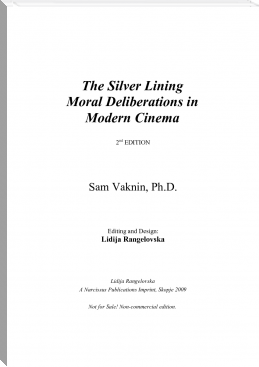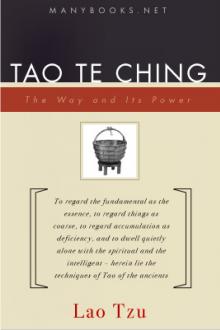The Art of War, Zi Sun [best short novels .txt] 📗

- Author: Zi Sun
- Performer: 0486425576
Book online «The Art of War, Zi Sun [best short novels .txt] 📗». Author Zi Sun
the enemy unprepared.
(5) He will win who has military capacity and is
not interfered with by the sovereign.
18. Hence the saying: If you know the enemy
and know yourself, you need not fear the result of a
hundred battles. If you know yourself but not the enemy,
for every victory gained you will also suffer a defeat.
If you know neither the enemy nor yourself, you will
succumb in every battle.
IV. TACTICAL DISPOSITIONS
1. Sun Tzu said: The good fighters of old first put
themselves beyond the possibility of defeat, and then
waited for an opportunity of defeating the enemy.
2. To secure ourselves against defeat lies in our
own hands, but the opportunity of defeating the enemy
is provided by the enemy himself.
3. Thus the good fighter is able to secure himself against defeat,
but cannot make certain of defeating the enemy.
4. Hence the saying: One may know how to conquer
without being able to do it.
5. Security against defeat implies defensive tactics;
ability to defeat the enemy means taking the offensive.
6. Standing on the defensive indicates insufficientstrength; attacking, a superabundance of strength.
7. The general who is skilled in defense hides in the
most secret recesses of the earth; he who is skilled in
attack flashes forth from the topmost heights of heaven.
Thus on the one hand we have ability to protect ourselves;
on the other, a victory that is complete.
8. To see victory only when it is within the ken
of the common herd is not the acme of excellence.
9. Neither is it the acme of excellence if you fight
and conquer and the whole Empire says, “Well done!”
10. To lift an autumn hair is no sign of great strength;
to see the sun and moon is no sign of sharp sight;
to hear the noise of thunder is no sign of a quick ear.
11. What the ancients called a clever fighter is
one who not only wins, but excels in winning with ease.
12. Hence his victories bring him neither reputationfor wisdom nor credit for courage.
13. He wins his battles by making no mistakes.
Making no mistakes is what establishes the certainty
of victory, for it means conquering an enemy that is
already defeated.
14. Hence the skillful fighter puts himself intoa position which makes defeat impossible, and does
not miss the moment for defeating the enemy.
15. Thus it is that in war the victorious strategist
only seeks battle after the victory has been won,
whereas he who is destined to defeat first fights
and afterwards looks for victory.
16. The consummate leader cultivates the moral law,and strictly adheres to method and discipline; thus it is
in his power to control success.
17. In respect of military method, we have,firstly, Measurement; secondly, Estimation of quantity;
thirdly, Calculation; fourthly, Balancing of chances;
fifthly, Victory.
18. Measurement owes its existence to Earth;
Estimation of quantity to Measurement; Calculation to
Estimation of quantity; Balancing of chances to Calculation;
and Victory to Balancing of chances.
19. A victorious army opposed to a routed one, is as
a pound’s weight placed in the scale against a single grain.
20. The onrush of a conquering force is like the bursting
of pent-up waters into a chasm a thousand fathoms deep.
V. ENERGY
1. Sun Tzu said: The control of a large force
is the same principle as the control of a few men:
it is merely a question of dividing up their numbers.
2. Fighting with a large army under your command
is nowise different from fighting with a small one:
it is merely a question of instituting signs and signals.
3. To ensure that your whole host may withstand
the brunt of the enemy’s attack and remain unshaken—
this is effected by maneuvers direct and indirect.
4. That the impact of your army may be like a grindstone
dashed against an egg—this is effected by the science
of weak points and strong.
5. In all fighting, the direct method may be used
for joining battle, but indirect methods will be needed
in order to secure victory.
6. Indirect tactics, efficiently applied, are inexhaustibleas Heaven and Earth, unending as the flow of rivers and streams;
like the sun and moon, they end but to begin anew;
like the four seasons, they pass away to return once more.
7. There are not more than five musical notes,
yet the combinations of these five give rise to more
melodies than can ever be heard.
8. There are not more than five primary colors
(blue, yellow, red, white, and black), yet in combination
they produce more hues than can ever been seen.
9. There are not more than five cardinal tastes
(sour, acrid, salt, sweet, bitter), yet combinations
of them yield more flavors than can ever be tasted.
10. In battle, there are not more than two methods
of attack—the direct and the indirect; yet these two
in combination give rise to an endless series of maneuvers.
11. The direct and the indirect lead on to each other in turn.
It is like moving in a circle—you never come to an end.
Who can exhaust the possibilities of their combination?
12. The onset of troops is like the rush of a torrent
which will even roll stones along in its course.
13. The quality of decision is like the well-timed
swoop of a falcon which enables it to strike and destroy
its victim.
14. Therefore the good fighter will be terriblein his onset, and prompt in his decision.
15. Energy may be likened to the bending of a crossbow;
decision, to the releasing of a trigger.
16. Amid the turmoil and tumult of battle, there may
be seeming disorder and yet no real disorder at all;
amid confusion and chaos, your array may be without head
or tail, yet it will be proof against defeat.
17. Simulated disorder postulates perfect discipline,simulated fear postulates courage; simulated weakness
postulates strength.
18. Hiding order beneath the cloak of disorder is
simply a question of subdivision; concealing courage under
a show of timidity presupposes a fund of latent energy;
masking strength with weakness is to be effected
by tactical dispositions.
19. Thus one who is skillful at keeping the enemy
on the move maintains deceitful appearances, according to
which the enemy will act. He sacrifices something,
that the enemy may snatch at it.
20. By holding out baits, he keeps him on the march;
then with a body of picked men he lies in wait for him.
21. The clever combatant looks to the effect of combined
energy, and does not require too much from individuals.
Hence his ability to pick out the right men and utilize
combined energy.
22. When he utilizes combined energy, his fightingmen become as it were like unto rolling logs or stones.
For it is the nature of a log or stone to remain
motionless on level ground, and to move when on a slope;
if four-cornered, to come to a standstill, but if
round-shaped, to go rolling down.
23. Thus the energy developed by good fighting men
is as the momentum of a round stone rolled down a mountain
thousands of feet in height. So much on the subject
of energy.
VI. WEAK POINTS AND STRONG
1. Sun Tzu said: Whoever is first in the field and
awaits the coming of the enemy, will be fresh for the fight;
whoever is second in the field and has to hasten to battle
will arrive exhausted.
2. Therefore the clever combatant imposes his will on
the enemy, but does not allow the enemy’s will to be imposed on him.
3. By holding out advantages to him, he can cause the enemy
to approach of his own accord; or, by inflicting damage,
he can make it impossible for the enemy to draw near.
4. If the enemy is taking his ease, he can harass him;
if well supplied with food, he can starve him out;
if quietly encamped, he can force him to move.
5. Appear at points which the enemy must hasten to defend;
march swiftly to places where you are not expected.
6. An army may march great distances without distress,
if it marches through country where the enemy is not.
7. You can be sure of succeeding in your attacks
if you only attack places which are undefended.You can
ensure the safety of your defense if you only hold
positions that cannot be attacked.
8. Hence that general is skillful in attack whose
opponent does not know what to defend; and he is skillful
in defense whose opponent does not know what to attack.
9. O divine art of subtlety and secrecy! Through you
we learn to be invisible, through you inaudible;
and hence we can hold the enemy’s fate in our hands.
10. You may advance and be absolutely irresistible,if you make for the enemy’s weak points; you may retire
and be safe from pursuit if your movements are more rapid
than those of the enemy.
11. If we wish to fight, the enemy can be forced
to an engagement even though he be sheltered behind a high
rampart and a deep ditch. All we need do is attack
some other place that he will be obliged to relieve.
12. If we do not wish to fight, we can prevent
the enemy from engaging us even though the lines
of our encampment be merely traced out on the ground.
All we need do is to throw something odd and unaccountable
in his way.
13. By discovering the enemy’s dispositions and remaininginvisible ourselves, we can keep our forces concentrated,
while the enemy’s must be divided.
14. We can form a single united body, while the
enemy must split up into fractions. Hence there will
be a whole pitted against separate parts of a whole,
which means that we shall be many to the enemy’s few.
15. And if we are able thus to attack an inferior force
with a superior one, our opponents will be in dire straits.
16. The spot where we intend to fight must not be
made known; for then the enemy will have to prepare
against a possible attack at several different points;
and his forces being thus distributed in many directions,
the numbers we shall have to face at any given point will
be proportionately few.
17. For should the enemy strengthen his van,he will weaken his rear; should he strengthen his rear,
he will weaken his van; should he strengthen his left,
he will weaken his right; should he strengthen his right,
he will weaken his left. If he sends reinforcements everywhere,
he will everywhere be weak.
18. Numerical weakness comes from having to prepareagainst possible attacks; numerical strength, from compelling
our adversary to make these preparations against us.
19. Knowing the place and the time of the coming battle,
we may concentrate from the greatest distances in order
to fight.
20. But if neither time nor place be known,
then the left wing will be impotent to succor the right,
the right equally impotent to succor the left, the van
unable to relieve the rear, or the rear to support the van.
How much more so if the furthest portions of the army are
anything under a hundred LI apart, and even the nearest
are separated by several LI!
21. Though according to my estimate the soldiersof Yueh exceed our own





Comments (0)